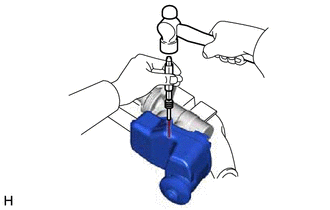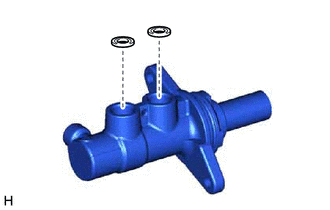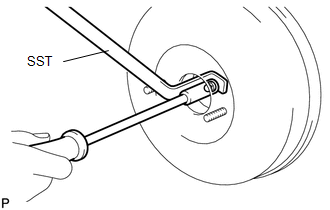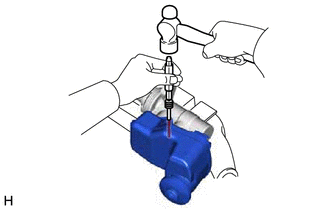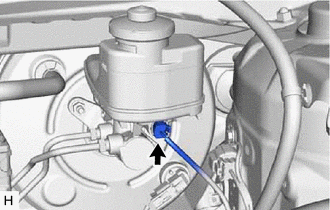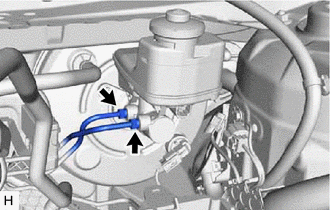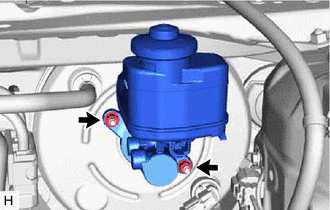Components
COMPONENTS
ILLUSTRATION
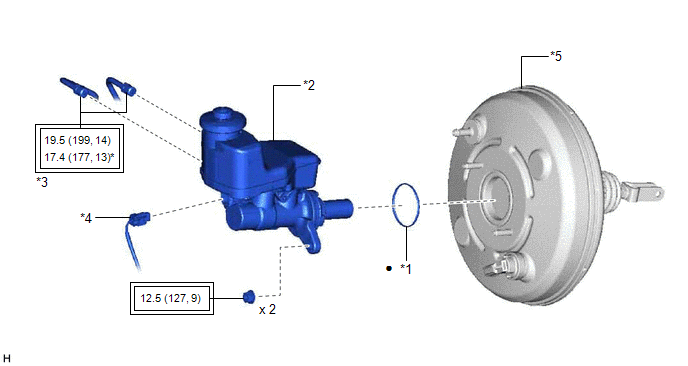
|
*1 | BRAKE MASTER CYLINDER O-RING |
*2 | BRAKE MASTER CYLINDER SUB-ASSEMBLY |
|
*3 | BRAKE LINE |
*4 | CONNECTOR |
|
*5 | BRAKE BOOSTER ASSEMBLY |
- | - |
 |
Tightening torque for "Major areas involving basic vehicle performance such as moving/turning/stopping" : N*m (kgf*cm, ft.*lbf) |
* | For use with a union nut wrench |
|
â—Ź | Non-reusable part |
- | - |
ILLUSTRATION
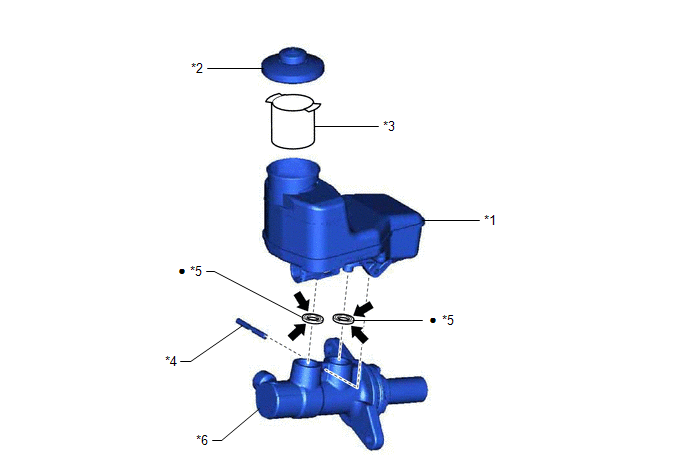
|
*1 | BRAKE MASTER CYLINDER RESERVOIR ASSEMBLY |
*2 | BRAKE MASTER CYLINDER RESERVOIR FILLER CAP ASSEMBLY |
|
*3 | BRAKE MASTER CYLINDER RESERVOIR STRAINER |
*4 | BRAKE MASTER CYLINDER STRAIGHT PIN |
|
*5 | MASTER CYLINDER RESERVOIR GROMMET |
*6 | BRAKE MASTER CYLINDER BODY |
|
â—Ź | Non-reusable part |
 |
Lithium soap base glycol grease |
Disassembly
DISASSEMBLY
PROCEDURE
1. REMOVE BRAKE MASTER CYLINDER STRAIGHT PIN
(a) Secure the brake master cylinder sub-assembly in a vise.
NOTICE:
Place aluminum plates on the vise to prevent damage to the brake master cylinder sub-assembly.
| (b)
Using a 5 mm pin punch and a hammer, tap out the brake master cylinder
straight pin from the brake master cylinder sub-assembly. NOTICE: Do not drop the brake master cylinder reservoir assembly. |
|
2. REMOVE BRAKE MASTER CYLINDER RESERVOIR ASSEMBLY
(a) Remove the brake master cylinder reservoir assembly from the brake master cylinder body.
3. REMOVE MASTER CYLINDER RESERVOIR GROMMET
| (a) Remove the 2 master cylinder reservoir grommets from the brake master cylinder body. |
|
(b) Remove the brake master cylinder body from the vise.
4. REMOVE BRAKE MASTER CYLINDER RESERVOIR FILLER CAP ASSEMBLY
5. REMOVE BRAKE MASTER CYLINDER RESERVOIR STRAINER
Inspection
INSPECTION
PROCEDURE
1. INSPECT AND ADJUST BRAKE BOOSTER PUSH ROD
NOTICE:
Make
the adjustment with no vacuum in the brake booster assembly. (Depress
the brake pedal several times with the engine stopped.)
HINT:
- Adjustment of the brake booster push rod is required when the brake master cylinder sub-assembly is replaced with a new one.
- Adjustment is not necessary when the removed brake master cylinder
sub-assembly is reused and the brake booster assembly is replaced with a
new one.
(a) Apply chalk to the tip of the accessory tool.
HINT:
The accessory tool is included with a new brake master cylinder sub-assembly.
| (b) Place the accessory tool on the brake booster assembly. |
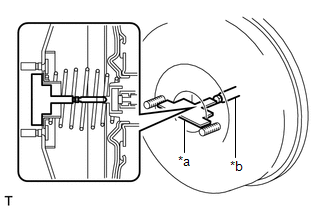 |
|
*a | Accessory Tool | |
*b | Brake Booster Push Rod | | |
(c) Measure the clearance between the brake booster push rod and accessory tool.
Standard Clearance:
0 mm (0 in.)
Adjust the clearance in the following cases:
- If there is clearance between the accessory tool and the shell of the
brake booster (the accessory tool does not contact the body of the brake
booster), the push rod is protruding too far.
- If the chalk does not stick on the tip of the brake booster push rod, the push rod protrusion length is insufficient.
| (d)
If the clearance is not as specified, adjust the push rod length by
holding the push rod using SST and turning the tip of the push rod using
a 7 mm socket driver. SST: 09737-00020 HINT: Check the push rod clearance again after adjustment. |
|
Installation
INSTALLATION
PROCEDURE
1. INSPECT AND ADJUST BRAKE BOOSTER PUSH ROD
Click here 
2. INSTALL BRAKE MASTER CYLINDER O-RING
(a) Install a new brake master cylinder O-ring to the brake master cylinder sub-assembly.
3. INSTALL BRAKE MASTER CYLINDER SUB-ASSEMBLY
NOTICE:
When
installing a new brake master cylinder sub-assembly, remove the
protectors from the master cylinder piston and outlet ports.
(a) Install the brake master cylinder sub-assembly to the brake booster assembly with the 2 nuts.
Torque:
12.5 N·m {127 kgf·cm, 9 ft·lbf}
NOTICE:
- The brake master cylinder sub-assembly requires careful handling. Do not
drop or subject the brake master cylinder sub-assembly to any impact.
Do not reuse a brake master cylinder sub-assembly that has been dropped.
- Do not hold the brake master cylinder sub-assembly by the master
cylinder piston. Hold the brake master cylinder sub-assembly by its body
or its reservoir when carrying it.
- Do not pull out the master cylinder piston.
- Do not strike or pinch the master cylinder piston, or cause any damage to the master cylinder piston by any other means.
- When installing the brake master cylinder sub-assembly to the brake
booster assembly, or when removing the brake master cylinder
sub-assembly from the brake booster assembly, make sure that the brake
master cylinder sub-assembly is kept horizontal or with its tip facing
downward (the master cylinder piston is facing upward) to prevent the
master cylinder piston from falling out.
- Do not allow any foreign matter to contaminate the master cylinder
piston. If any foreign matter gets on the master cylinder piston, remove
it by using a piece of new and dry cloth. Do not use water or
detergent. Then apply an even layer of lithium soap base glycol grease
around the circumference (sliding part) of the master cylinder piston.
- Do not use any other types of grease.
- Do not kink or damage the brake lines.
- Do not allow the brake lines to twist or interfere with other parts or the vehicle body during tightening.
- Do not allow any foreign matter such as dirt or dust to enter the brake lines from the connecting parts.
| (b) Using a union nut wrench, connect the 2 brake lines to the brake master cylinder sub-assembly.
Torque: Specified tightening torque : 19.5 N·m {199 kgf·cm, 14 ft·lbf}
NOTICE:
- Do not kink or damage the brake lines.
- Do not allow the brake lines to twist or interfere with other parts or the vehicle body during tightening.
- Do not allow any foreign matter such as dirt or dust to enter the brake lines from the connecting parts.
HINT:
|
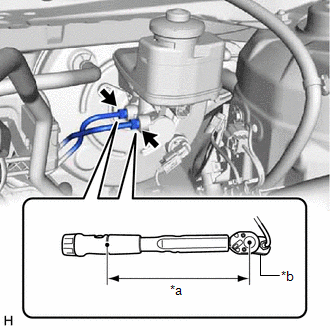 |
|
*a | Torque Wrench Fulcrum Length | |
*b | Union Nut Wrench | | |
(c) Connect the connector to the brake master cylinder sub-assembly.
4. BLEED BRAKE SYSTEM
Click here 
5. INSTALL BATTERY
Click here

Reassembly
REASSEMBLY
PROCEDURE
1. INSTALL BRAKE MASTER CYLINDER RESERVOIR STRAINER
2. INSTALL BRAKE MASTER CYLINDER RESERVOIR FILLER CAP ASSEMBLY
3. INSTALL MASTER CYLINDER RESERVOIR GROMMET
(a)
Apply a light layer of lithium soap base glycol grease to the entire
circumference of 2 new master cylinder reservoir grommets.
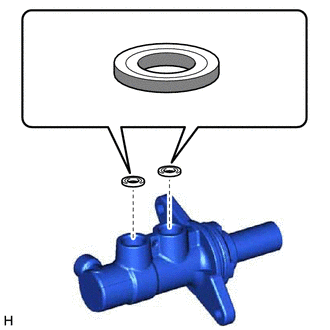
 | Lithium Soap Base Glycol Grease |
(b) Install the 2 master cylinder reservoir grommets to the brake master cylinder body.
4. INSTALL BRAKE MASTER CYLINDER RESERVOIR ASSEMBLY
(a) Secure the brake master cylinder body in a vise.
NOTICE:
Place aluminum plates on the vise to prevent damage to the brake master cylinder body.
(b) Install the brake master cylinder reservoir assembly to the brake master cylinder body.
NOTICE:
Do not drop the brake master cylinder reservoir assembly.
5. INSTALL BRAKE MASTER CYLINDER STRAIGHT PIN
| (a)
Using a 5 mm pin punch and a hammer, tap in the brake master cylinder
straight pin to secure the brake master cylinder reservoir assembly. |
|
(b) Remove the brake master cylinder sub-assembly from the vise.
Removal
REMOVAL
CAUTION / NOTICE / HINT
The
necessary procedures (adjustment, calibration, initialization or
registration) that must be performed after parts are removed and
installed, or replaced during brake master cylinder sub-assembly
removal/installation are shown below.
Necessary Procedures After Parts Removed/Installed/Replaced |
Replaced Part or Performed Procedure |
Necessary Procedure | Effect/Inoperative Function when Necessary Procedure not Performed |
Link |
|
*: When performing learning using the Techstream.
Click here  |
|
Battery terminal is disconnected/reconnected |
Perform steering sensor zero point calibration |
Lane departure alert system (w/ Steering Control) |
 |
|
Pre-collision system |
|
Intelligent Clearance Sonar System* |
|
Lighting System (for Gasoline Model with Cornering Light) |
|
Memorize steering angle neutral point |
Parking assist monitor system |
 |
|
Panoramic View Monitor System |
 |
NOTICE:
Make
sure to release vacuum from the brake booster assembly before removing
the brake master cylinder sub-assembly from the brake booster assembly.
PROCEDURE
1. PRECAUTION
NOTICE:
After
turning the engine switch off, waiting time may be required before
disconnecting the cable from the negative (-) battery terminal.
Therefore, make sure to read the disconnecting the cable from the
negative (-) battery terminal notices before proceeding with work.
Click here

2. REMOVE BATTERY
Click here

3. DRAIN BRAKE FLUID
NOTICE:
If brake fluid leaks onto any painted surface, immediately wash it off.
4. REMOVE BRAKE MASTER CYLINDER SUB-ASSEMBLY
| (a) Disconnect the connector from the brake master cylinder sub-assembly. |
|
| (b) Using a union nut wrench, disconnect the 2 brake lines from the brake master cylinder sub-assembly.
NOTICE:
- Do not damage or deform the brake lines.
- Do not allow any foreign matter such as dirt or dust to enter the brake lines from the connecting parts.
| |
| (c) Remove the 2 nuts and brake master cylinder sub-assembly from the brake booster assembly.
NOTICE:
- The brake master cylinder sub-assembly requires careful handling. Do not
drop or subject the brake master cylinder sub-assembly to any impact.
Do not reuse a brake master cylinder sub-assembly that has been dropped.
- Do not hold the brake master cylinder sub-assembly by the master
cylinder piston. Hold the brake master cylinder sub-assembly by its body
or its reservoir when carrying it.
- Do not pull out the master cylinder piston.
- Do not strike or pinch the master cylinder piston, or cause any damage to the master cylinder piston by any other means.
- When installing the brake master cylinder sub-assembly to the brake
booster assembly, or when removing the brake master cylinder
sub-assembly from the brake booster assembly, make sure that the brake
master cylinder sub-assembly is kept horizontal or with its tip facing
downward (the master cylinder piston is facing upward) to prevent the
master cylinder piston from falling out.
- Do not allow any foreign matter to contaminate the master cylinder
piston. If any foreign matter gets on the master cylinder piston, remove
it by using a piece of new and dry cloth. Do not use water or
detergent. Then apply an even layer of lithium soap base glycol grease
around the circumference (sliding part) of the master cylinder piston.
- Do not use any other types of grease.
- Make sure to release vacuum from the brake booster assembly before
removing the brake master cylinder sub-assembly from the brake booster
assembly.
| |
5. REMOVE BRAKE MASTER CYLINDER O-RING
(a) Remove the brake master cylinder O-ring from the brake master cylinder sub-assembly.




